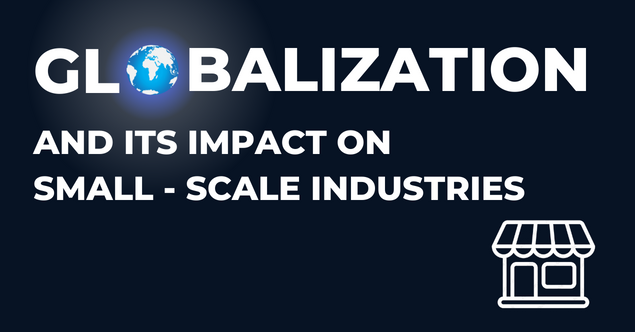Globalization is a part of the modern world. It brings benefits to our everyday lives such as easy access to a variety of different cuisines, cultures, products and new technologies developed by other countries. Even though globalization improves our lives, it brings challenges as small companies start to grow and expand internationally.
Cultural differences around the world are undeniable which can create hurdles for businesses entering foreign markets and necessitate changes to their daily business flow, whether it’s employing workers in a new region or communicating the value of their product to a new audience to know more about globalisation impact on small business first let see what is globalisation.
Globalization can refer to the spread of the flow of financial products, goods, technology, data, and jobs on an international level and across cultures. In economic terms, it describes an interdependence of nations through free trading.
Globalization
Globalization is a term used to describe how trade, technology, ideas, knowledge, information, goods and services have made the world more connected and interdependent. Globalization also captures in its scope the economic and social changes that have come about.
If we talk in business terms, you can use it in an economic context to describe integrated economies marked by free trade, the free flow of capital among other countries and easy access to foreign resources, including labour markets, to maximize returns and benefit for the common good.
In simple terms, globalisation is the process by which people and goods move quickly across other nations. The integration of markets, trade and investments with few barriers slows the flow of products and services between nations. There is also a cultural element, as ideas and traditions are traded.
Why is Globalization important?
Globalization is about the world getting interconnected. Countries today are more connected than ever before, due to factors such as air travelling, internet sea shipping, international trade agreements and legal treaties etc.
In the world of business, globalization is connected with trends such as outsourcing, free trade, and international supply chains. Globalization is important as it increases the size of the global market and allows more and different goods & services.
Globalization is crucial because it is one of the most powerful forces affecting the modern world For example, many of the largest and most successful industries in the world are in effect truly multinational organizations, with offices and supply chains stretched right across the globe.
Three Types of globalisation
1) Economic globalization
Economic globalization integrates several liberalist, conservative and hybrid economies which interconnected the marketplace. Constantly influencing each other, these markets are somewhat more interdependent.
Economic globalization can also be seen in the performance of stock markets in one country fluctuating based on financial news in another country.
Globalization of the economy also means that companies trade freely and set up infrastructure in another.
Benefits of economic globalisation:
Employees in developing countries have more opportunities
Increased capital consumption
Better products at lower cost
Increased income
2) Political globalization
Political globalisation refers to the effects of political relationships between countries.
For example setting up international organizations such as the UN, NATO, and WTO, which debate and regulate international politics and trade.
Benefits of political globalization
Formation of international organizations
Healthy competition between nations for socioeconomic growth
A collective effort between other countries towards common problems
Decentralization of the nation-state
3) Social globalisation
Social globalisation is the integration of societies across the world.
Social globalisation refers to the impact of globalisation on the life and work of people, their families, cultures and their societies. Concerns and issues are often raised about the impact of globalization on social protection.
Benefits of social globalisation
- Increased exposure to different cultures and lifestyles
- Building diverse human resource
- Starts a dialogue for various international problems
How Globalization Impact Small Scale Industries
1) Technology and Innovation
You get a connection to the world constantly, so the knowledge and technological advances get easily accessed. Companies from abroad bring with them newer technology, innovation and expertise which can lower costs by reaping the economies of scale.
2) Lower costs for products
Globalization allows companies to find lower-cost ways to produce their products as mentioned above that brings new technology. It also drives prices down and creates a more enormous variety of choices for consumers.
Lowered costs help people in both developing and already-developed countries lifestyle better with less money which is ultimately a good advantage for small-scale industries.
3) Access to new skills
In addition to new markets, globalization allows small-scale industries to find new, specialized skills that are not available in their current market. Globalization gives companies the opportunity to explore talent in booming markets such as Silicon Valley. Again, businesses can globally hire easier employees.
4) Scope of the market increases
Selling in your own company can limit your commodity globalization and helps you to spread your business globally. You get a wider audience range in globalization and your brand gets more visibility with an even greater reach in the market.
5) Expansion of business
Certain companies need the opportunity to go international level. Globalization and sufficient attempts to open up trade lines have resulted in business networks. Businesses of all sizes can target international markets which give them new revenue streams, without the substantial investment required to open a global branch of an established business.
6) Budget marketing
Nowadays, the internet opportunity has made marketing easy that comes with social media and global ad targeting. Even the smallest business gets the benefits from data collection tools and methods to create budget marketing.
7) Made the hiring process easy
Globalisation has also impacted the availability of remote workers. Where we can hire employees globally. Small businesses now could only have physical workers, they can now have employees employed in offices on the international level. Alternatively, they can hire an entire firm department that can work remotely.
Benefits of globalization to small-scale industries
1) Economical impact
Globalization has increased the trade and economic exchanges between nations in the world. It has strong global economic growth. This helps to share knowledge with international corporations easier and faster.
2) Reduce barriers to working
The idea of free trade is to remove the business barriers to work such as tariffs, subsidies, and other laws imposed between countries for trading purposes.
3) Affordable productions
It not only brings job opportunities for the local people but also means that productions for goods become affordable by the consumer too. Goods being promoted the right way will be accessible to consumers at affordable prices.
4) Cheap Labour
Small-scale industries get access to cheaper labour. Globalization leads to increased labour movement from other countries, so small businesses can also benefit from this along with larger businesses.
Disadvantages of Globalization to small-scale industries
1) Unemployment
As the business grows internationally it will hire employees from other countries who can work for them at lower wages which can affect the country's economy where they live.
2) The competition will get increase
Globalization increases more and more businesses entering the market. For example, like your business, there are other ten businesses selling similar products, which means that companies now need to improve more with the quality products and lower prices enough to stay globally competitive.
3) Imbalanced Trade
A trade imbalance, which is also known as a trade deficit, occurs when a country spends more on imports than it makes on exports. This creates a shortfall in the finances that the country must make up for either by borrowing money from foreign lenders or by permitting foreign investments in its assets.
Examples of Globalization
Multinational corporations such as Amazon, Google, Apple, Netflix and Facebook are examples of international corporations that have not only benefited from globalization but have been one of the main engines of their successful business.
Each of these products creates goods and services that are considered indispensable by people across the world. With the World Trade Organization (WTO) and United Nations (UN) allowing international trade reforms and agreements on tariffs, it has become easier for domestic entities to go worldwide. Additionally, due to the FDIs, many industries can now find a firm in the international markets.
Future of globalization
The future of globalization will boost increasing innovation, development, and new technology, and startups & small businesses will witness more integration and interconnectedness.
Enhancing this is the inherent high mobility. Developing and emerging markets will be most affected due to their development needs and demand for new skills will increase. As Technology will get advances, particularly blockchain, communication and industry, will fuel economic globalization.
Challenges of globalization faced by small-scale industries
1) Worker exploitation
Many companies in developed countries have outsourced their production and a few of their services to developing countries. While this has typically been good for local economies in developing countries, local employees are still exposed to high degrees of exploitation.
In developing countries, companies have additionally been able to build more and more exploitatory demands of their workers as they're able to supply cheaper labour elsewhere.
2) Job Loss
Globalization affects the loss of jobs. This is often significantly the case in developed countries that adore the US, wherever several services and unskilled labour are outsourced to developing countries. several natives have lost their jobs or been forced to accept lesser wages and poorer operating conditions.
Although governments must guard the local manpower and make favourable business conditions for companies, you may still have to be compelled to assess however you wish your business to figure around this challenge.
3) High Investment
Globalization and international enlargement are typically terribly expensive endeavours. T It needs businesses to take a position tons of their resources into coming up with and implementing an efficient globalisation strategy. putting in an organization or presence elsewhere, paying taxes, hiring, and scouring the client base these things need mountains of research, capital, and time. Not all corporations can feel comfortable doing this, particularly small-scale businesses or those scaling up globally.
4) Taxes
Taxes may be a nightmare for workers and businesses. Different countries or states have their tax authorities and distinctive rules on what taxes have to be compelled to be paid, how, to whom, and when. Several regional and national governments and organisations are currently operating to clamp down on corporations finding loopholes thus as to not pay corporate taxes. you may have to be compelled to do your analysis to remain on the right side of the law where your business operates.
5 Best Globalization quotes by world influencers
Where globalization means, as it so often does, that the rich and powerful now have new means to further enrich and empower themselves at the cost of the poorer and weaker, we have a responsibility to protest in the name of universal freedom.- Nelson Mandela
Outsourcing and globalization of manufacturing allow companies to reduce costs, benefit consumers with lower-cost goods and services, cause economic expansion that reduces unemployment, and increase productivity and job creation - Larry Elder
While globalization will make the world smaller and more accessible, we must continue to appreciate its vibrant diversity- Jean-Philippe Courtois
The 1 to 2 billion poorest in the world, who don't have food for the day, suffer from the worst disease: globalization deficiency. The way globalization is occurring could be much better, but the worst thing is not being part of it. For those people, we need to support good civil societies and governments.- Hans Rosling
Globalization is going to bring us closer and closer together across nations and technology you can't stop.- John P. Kotter
Summary
Understanding how globalization impacts startups and small businesses. Small businesses stand to benefit in many ways such as worldwide opportunity, can reach new markets, and employment will increase. Easy access to a variety of different cultures, and new technologies developed by other countries.
In general, globalization decreases the cost of manufacturing which means that small-scale industries can offer goods at a lower price to consumers. The average cost of goods, and products is a key aspect that contributes to increases in the standard of living in society. Consumers also have access to a huge variety of goods.
FAQ's on Globalization:
Globalization is the process by which people and goods move easily and access internationally.
Globalisation decreases the cost of manufacturing in the country. This means that companies can offer goods at a lower price to consumers.
Globalization creates more significant opportunities for firms in less industrialized countries to tap into more and larger global markets.





